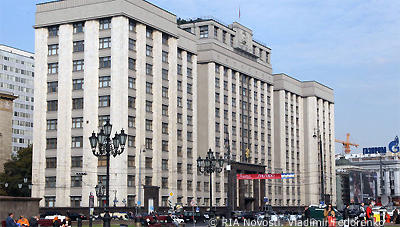Russian Duma Approves ‘Foreign Agents’ Bill That Threatens Journalists With Label

(Article text ©2019 RFE/RL, Inc., Radio Free Europe/Radio Liberty – rferl.org – Nov. 21, 2019 – article text also appeared at rferl.org/a/russian-duma-approves-foreign-agents-bill-threatens-journalists/30284789.html)
The Russian parliament’s lower chamber, the State Duma, has approved the final reading of a bill allowing reporters who work for organizations officially listed as foreign agents to be designated as foreign agents themselves.
The bill, approved on November 21, says that individuals may be listed as foreign agents if they collaborate with foreign media organizations and receive financial or other material support from them.
The bill now has to be approved by the parliament’s upper chamber, the Federation Council, before President Vladimir Putin signs it into the law.
Russia passed the foreign agent law — which requires all NGOs receiving foreign funding to register — in 2012 following the biggest wave of anti-government protests since Vladimir Putin came to power. Putin blamed Western influence and money for those protests.
On November 15, Russia’s Justice Ministry listed RFE/RL’s Sever.Realii website as “foreign agent” saying the decision was based on conclusions made by the parliamentary committee on an investigation into meddling in the country’s internal affairs.
RFE/RL President Jamie Fly said that move was “politically motivated and targets RFE/RL’s Sever.Realii unit for northwestern Russia, as it has been used to target other RFE/RL Russian-speaking services.”
“It is an attempt to silence independent media in Russia and deprive Russian audiences of access to information that is not under Kremlin control. U.S. law guarantees RFE/RL’s editorial independence. Any suggestion that we or our journalists are agents of any government is false,” he added.
In December 2017, the Justice Ministry listed Current Time TV, several RFE/RL services and projects, such as its Russian Service, Tatar-Bashkir Service, Sibir.Realii, Idel.Realii, Factograph, Kavkaz Realii, and Krym.Realii, as well as the Voice of America, as “foreign mass media performing the functions of a foreign agent.”
Russian officials have said the law is a “symmetrical response” after Russia’s state-funded channel RT — which U.S. authorities accuse of spreading propaganda — was required to register its U.S. operating unit under the U.S. Foreign Agents Registration Act (FARA).
U.S. officials have said the action is not symmetrical, arguing that the U.S. and Russian laws are different and that Russia uses its “foreign agent” legislation to silence dissent and discourage a free exchange of ideas.
Human Rights Watch, a U.S.-based rights group, in 2017 called the law “devastating” for local NGOs, saying more than a dozen had been forced to close their doors.
With reporting by TASS and Interfax
